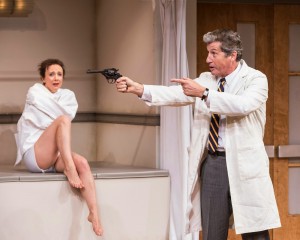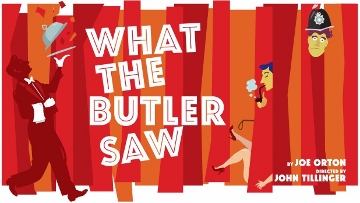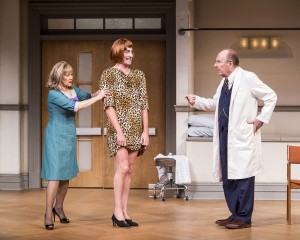WHAT DIDN’T HE
Joe Orton was a loudly subversive English playwright who, before his murder in 1967, helped rip out the loud, inefficient plumbing of kitchen sink social drama and replace it with something really dangerous: comedy. In a series of black farces, Orton substituted the Socialist Rape Victim for John Osborne’s Angry Young Man. Going on fifty years later, his buffoonish satire strikes me as more poignant than the serious-as-a-drinking-problem frustrations of Osborne, Alan Sillitoe, and other dour critics of the postwar British scene. In the tradition of the classic satirists, Orton’s concerns were also those of the kitchen sinkers: hypocrisy, corruption, abuse of authority.
Of those postwar voices, only his is routinely compared with Oscar Wilde’s, and not just because they were both comedians who specialized in phrasemaking. They also share the moral courage of the born outlaw. Given the dual head start of being born poor and writing in a post-Wilde world, Orton is the more anarchic of the two, and much the less snobbish. If he never spoke truth to power as winsomely as Wilde did in Salome, it is probably less because he died too soon than because he wouldn’t have had the patience.
 “My brief is infinite,” says a government shrink in the first act of Orton’s What the Butler Saw, before proceeding to try and straitjacket every other character for the delusions he imagines them to have. Orton’s England is a nanny state of benevolent Orwellianism, inflicted on a helpless, bewildered proletariat by officialdom run amok and spouting smug, self-perpetuating syllogisms. The story begins when a doctor matter-of-factly “seduces” his new secretary by trapping her naked in his office. It’s a sickening situation, the girl just-not-dumb-enough to recognize the injustice and yet incapable of preventing it, and therein lies the earthy heart of the humor. When the doctor’s wife stumbles onto the scene, and then a public health bigwig, the stakes couldn’t be higher – not only a marriage and a career but a blameless young person may be sacrificed to simple lust. The scenario only gets more frightening when this standard farce premise requires a drugged, bleeding policeman to drop his uniform and wear a dress belonging to the doctor’s wife, who equates sexual satisfaction with sexual assault; when everybody sane gets committed by a lunatic; when people are shot; when a woman is killed by Winston Churchill’s flying penis. Say what you will about Orton’s taste, it must be counted in his favor that he never saw a transgression he didn’t like. He goes all the way there, diligently, every time.
“My brief is infinite,” says a government shrink in the first act of Orton’s What the Butler Saw, before proceeding to try and straitjacket every other character for the delusions he imagines them to have. Orton’s England is a nanny state of benevolent Orwellianism, inflicted on a helpless, bewildered proletariat by officialdom run amok and spouting smug, self-perpetuating syllogisms. The story begins when a doctor matter-of-factly “seduces” his new secretary by trapping her naked in his office. It’s a sickening situation, the girl just-not-dumb-enough to recognize the injustice and yet incapable of preventing it, and therein lies the earthy heart of the humor. When the doctor’s wife stumbles onto the scene, and then a public health bigwig, the stakes couldn’t be higher – not only a marriage and a career but a blameless young person may be sacrificed to simple lust. The scenario only gets more frightening when this standard farce premise requires a drugged, bleeding policeman to drop his uniform and wear a dress belonging to the doctor’s wife, who equates sexual satisfaction with sexual assault; when everybody sane gets committed by a lunatic; when people are shot; when a woman is killed by Winston Churchill’s flying penis. Say what you will about Orton’s taste, it must be counted in his favor that he never saw a transgression he didn’t like. He goes all the way there, diligently, every time.
 That the Center Theatre Group has revived a play so packed with rape jokes will trouble some people. These are the people whose insensitivity has made it difficult to tell any joke at all without enduring a protest. I’m all for the Stop/Kisses and Death and the Maidens; there is a place for every sort of political exploration, and sober investigation surely can carry artistic merit. No less the laugh. Orton’s are the rape jokes of bleakest horror, the butt of the joke not just the perpetrator but everyone who allows the corruption of our institutions, and yes, the victims most especially. When we’re all screwed and we’re all culpable, that’s when you know you’re not watching some stupid sex comedy. Whether heretic peasant or lustful prince, Orton’s characters are each trapped in their own ring of bureaucratic hell. Every dirty joke is earned, because unlike a fake moralist, Orton generously invests the human race with all its capacity for folly.
That the Center Theatre Group has revived a play so packed with rape jokes will trouble some people. These are the people whose insensitivity has made it difficult to tell any joke at all without enduring a protest. I’m all for the Stop/Kisses and Death and the Maidens; there is a place for every sort of political exploration, and sober investigation surely can carry artistic merit. No less the laugh. Orton’s are the rape jokes of bleakest horror, the butt of the joke not just the perpetrator but everyone who allows the corruption of our institutions, and yes, the victims most especially. When we’re all screwed and we’re all culpable, that’s when you know you’re not watching some stupid sex comedy. Whether heretic peasant or lustful prince, Orton’s characters are each trapped in their own ring of bureaucratic hell. Every dirty joke is earned, because unlike a fake moralist, Orton generously invests the human race with all its capacity for folly.
 John Tillinger has a significant history of directing Orton, in New York and at the Mark Taper Forum, and his new staging has almost a stately feel, a reverence for its text, if such terms may be applied to incendiary material. Unfortunately this translates as a slight lack of pace. The excellent cast, led by Britons Paxton Whitehead, Charles Shaughnessy and Frances Barber, is as well equipped for this demanding stuff as one could wish. Still, it is a farce, and one does wish the doors on James Noone’s pretty set were not so far apart, and that the actors would open them faster and slam them harder. But if the show does not fly, neither does it lag. It is a well-informed, well-acted, well-designed approximation of the revolutionary reek still bursting from Orton’s grave. Most importantly, it is funny. It proves that the theater remains a fine venue for social protest, provided that entertainment is a means to agenda, and not the other way around.
John Tillinger has a significant history of directing Orton, in New York and at the Mark Taper Forum, and his new staging has almost a stately feel, a reverence for its text, if such terms may be applied to incendiary material. Unfortunately this translates as a slight lack of pace. The excellent cast, led by Britons Paxton Whitehead, Charles Shaughnessy and Frances Barber, is as well equipped for this demanding stuff as one could wish. Still, it is a farce, and one does wish the doors on James Noone’s pretty set were not so far apart, and that the actors would open them faster and slam them harder. But if the show does not fly, neither does it lag. It is a well-informed, well-acted, well-designed approximation of the revolutionary reek still bursting from Orton’s grave. Most importantly, it is funny. It proves that the theater remains a fine venue for social protest, provided that entertainment is a means to agenda, and not the other way around.
photos by Craig Schwartz
What the Butler Saw
Mark Taper Forum
scheduled to end on December 21, 2014
for tickets, call 213.628.2772 or visit www.CenterTheatreGroup.org


